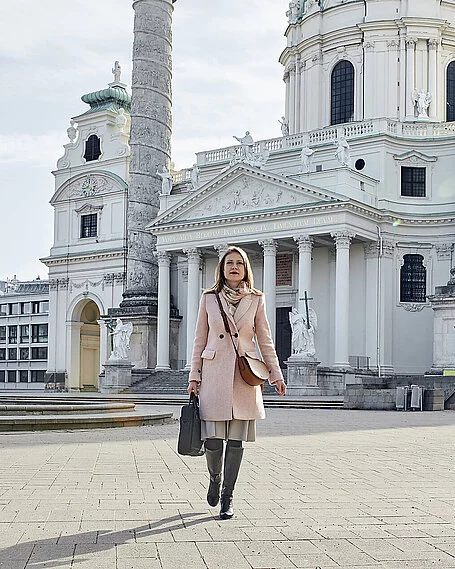
Red-White-Red-Card Plus
The Red-White-Red – Card Plus (“Rot-Weiß-Rot – Karte Plus”) is a residence permit for third-country nationals that aims at facilitating the long-term stay of skilled workers and their families in Austria. Among other things, the Red-White-Red – Card Plus offers unrestricted access to the Austrian labour market. This means that you can work both as a salaried employee or be self-employed, and that you are not bound to a specific employer. The Red-White-Red – Card Plus is relevant for various target groups and is valid for a period of up to 3 years depending on the specific target group.
The Red-White-Red – Card Plus
for Family Members of Skilled Workers
The Red-White-Red – Card Plus is a residence permit (“Aufenthaltstitel”) for third-country nationals who are family members of skilled workers with certain residence permits. This includes skilled workers who are holders of a:
- Red-White-Red – Card (“Rot-Weiß-Rot – Karte”)
- EU Blue Card (“Blaue Karte EU“)
- Settlement Permit – Researcher (“Niederlassungsbewilligung – Forscher“)
- Red-White-Red – Card Plus if the skilled worker had a Red-White-Red – Card, EU Blue Card or a Settlement Permit – Researcher beforehand
- Long-Term Resident EU permit (“Daueraufenthalt EU”) if the skilled worker had a Red-White-Red – Card, an EU Blue Card or a Settlement Permit – Researcher in the past
Family members can either immigrate together with the skilled worker or come to Austria at a later stage. The Austrian employer can file both the skilled worker's application as well as his/her family members' applications to the Austrian Immigration Authority (this does not apply to researchers and their family members).
Family members of a skilled worker holding a Red-White-Red – Card, an EU Blue Card or a Settlement Permit – Researcher receive a Red-White-Red – Card Plus valid for the same period as the permit of the skilled worker.
If you immigrate to Austria with your family and apply for an EU Blue Card, a Red-White-Red - Card or a Settlement Permit – Researcher, your residence permit is ideally valid for 2 years. For this, both your passport and your job offer/employment contract must be valid for at least 2 years. The Red-White-Red - Cards Plus of your family members are also valid for 2 years if all passports are valid for at least 2 years.
Family members are only considered to be minor children and wives/husbands or civil partners (“eingetragene Partnerinnen/eingetragene Partner”). As a rule, children over the age of 18 are not allowed to receive a residence permit via their parents. Instead, they have to demonstrate that they themselves have a purpose for staying in Austria, for example if they study or work in the country.
Every family member requires the following documents in order to receive the Red-White-Red – Card Plus:
- Application formApplication form ()
- Passport
- Passport photo fulfilling EU criteria (not older than 6 months)
- Personal documents:
- Birth certificate (only for children)
- Police Clearance Certificate (“Strafregisterbescheinigung”) which is not older than 3 months for all family members who are 14 years or older
- Marriage certificate or civil partnership certificate
- Proof of German language skills at an A1 level for all family members older than 14 years
The German certificate must not be older than 1 year when submitted.
As a rule, only the following certificates are recognised: German Language Certificate Austria (ÖSD), Austrian Integration Fund (ÖIF), The European Language Certificates (TELC) and the Goethe Institute.
If the skilled worker in the family holds one of the following residence permits, family members do not have to show a German certificate:
- Red-White-Red – Card for Very Highly Qualified Workers
- EU Blue Card
- Settlement Permit – Researcher
- Red-White-Red – Card Plus, if the skilled worker held a Red-White-Red – Card for Very Highly Qualified Workers, an EU Blue Card or a Settlement Permit – Researcher beforehand
- Long-Term Resident EU permit, if the skilled worker held a Red-White-Red – Card for Very Highly Qualified Workers, an EU Blue Card or a Settlement Permit – Researcher in the past
Family members who completed studies at a recognised university or can present proof of general university entrance qualification or completed a vocational secondary school do not need a German A1 certificate either. Instead, relevant proof must be submitted to the immigration authority. Legalisation Legalisation ()may be necessary depending upon the country of issue. It is important that the educational institution from which the university diploma or general university entrance qualification or school leaving certificate from the vocational secondary school is recognized and that the relevant document was issued in German or English or underwent translation by a court-certified translator. This proof is valid both as a substitute for the German Certificate A1 upon initial immigration of family members as well as for the Integration Certificate A2 (Module 1 of the Integration Agreement).
Proof of long-term accommodation in Austria
Normally, the rental agreement (“Mietvertrag”) is presented.
If the apartment or house is not rented but was purchased, it is necessary to present an updated excerpt from the land registry (“Grundbuchauszug”).
As a rule, short-term apartment and hotel reservations are not recognised.
There has to be sufficient living space for all family members. For example, an apartment with one room of 30 m2 is not considered to be sufficient for a family of four.
If you move in with someone who already lives in Austria, the rental agreement or excerpt from the land registry of this person suffices together with the right of habitation (“Wohnrechtsvereinbarung”) there. In this case, it is also important to ensure that not too many people will live in too little space.
Proof of health insurance coverage in Austria
If the skilled worker in the family is insured with the Austrian Health Insurance Fund (Österreichische Gesundheitskasse - ÖGK), the family is usually included in the insurance coverage via co-insurance.
For the transition period (time during which the skilled worker is already in Austria but has not yet begun to work) and/or for the trip to Austria, it is recommended to take out travel insurance. As a rule, third-country nationals who require a Visa D to enter the country must present such a travel insurance policy when applying for their Visa D to the Austrian representative authority (embassy/consulate) in the country they live in.
Fees: € 218


Please note the following:
You will have to present one or more Police Clearance Certificates depending upon the country in which you live. Please find further information herehere ().
- Personal documents must be specially legalised so that these documents are officially recognised. This depends upon the country in which the documents were issued. Here you can check which type of verificationtype of verification () is necessary.
- If personal documents were not issued in German or English, they must be translated by a court-certified translator (“gerichtlich beeidete:r Übersetzer:in”).
- If you have to show additional personal documents or if you need a Visa D, the fee to be paid may actually be higher than € 218.
Are you a family member of a skilled worker and want to immigrate to Austria? In applying for your Red-White-Red – Card Plus, it is important whether or not you are allowed to enter Austria without a visa.
Are you allowed to enter Austria without a visawithout a visa ()? As soon as you have gathered all the necessary documents, you can come to Austria and submit your application for your Red-White-Red Card – Plus to the Immigration Authority (“Aufenthaltsbehörde”). The application will then be processed for several weeks before approval. Subsequently, your Red-White-Red Card – Plus will be printed. You are permitted to begin working in Austria as soon as you receive your card.
Please pay attention to the number of visa-free days you are entitled to! Generally, you have 90 days (out of 180) in which you can stay in the Schengen Area. If you have not received your Red-White-Red Card Plus within these 90 days, you must leave the Schengen Area and apply for the Visa D in the country in which you currently live.
Are you not permitted to enter Austria without a visa without a visa ()? In this case, there are two options:
- Your family member's future Austrian employer files your complete application package simultaneously with that of the skilled worker. All applications will be processed and approved by the Austrian authority.
- You submit your entire application package for the Red-White-Red – Card Plus to the Austrian representative authority (embassy/consulate) in the country in which you currently live. Your application will then be sent to Austria by the representative authority where it will be processed. This option requires a little more time.
Once your application has been approved, you will receive an invitation from your local Austrian representative authority, asking you to apply for a so-called Visa D within the following 3 months and to pick up your Red-White-Red Card – Plus in Austria within a period of 6 months. In order to receive a Visa D, you will need the following documents:
- Application formApplication form ()
- Passport plus copy
- Invitation of the representative authority
- Approval of the Immigration Authority
- Travel insurance (coverage of at least € 30,000)
- Flight reservation
- About 150 €
Generally, it will take about 2 weeks until the Visa D is stamped in your passport. During this processing time, the representative authority will keep your passport. As soon as you have your Visa D, you can travel to Austria and have your fingerprints taken. Furthermore, you will also have to show your personal documents (passport, birth certificate, police clearance certificate, etc.). Your Red-White-Red Card – Plus will then be printed. Once you receive it, you are permitted to begin working in Austria.
A special regulation is in place for family members of skilled workers who apply for an EU Blue Card or a Settlement Permit – Researcher and cannot enter without a visa. If this applies to you and neither of the above-mentioned options of submitting applications appeals to you, you can travel to Austria to apply for a Red-White-Red – Card Plus in person if you have a valid visa. (This also applies to third-country national skilled workers themselves who are not allowed to enter Austria without a visa, but who wish to submit their application for an EU Blue Card or a Settlement Permit – Researcher in Austria).
In this case, you are entitled to stay in Austria during the process as long as your visa is valid. If the visa expires before you receive your Red-White-Red – Card Plus, you would have to leave the country in time. For a new entry to collect your Red-White-Red – Card Plus, you would have to apply for a Visa D at the respective Austrian representative authority (embassy/consulate).
- You have a Red-White-Red Card, an EU Blue Card or a Settlement Permit – Researcher and are having a child in Austria? You can apply for a Red-White-Red – Card Plus for your child as soon as you have the birth certificate. Learn more about residence permits for newborns herehere ().
The Red-White-Red – Card Plus as an extension of residence permits
The Red-White-Red – Card Plus (“Rot-Weiß-Rot – Karte Plus”) is a residence permit for skilled workers who are third-county nationals, who have been working and living in Austria for at least 21 months, and who have one of the following residence permits:
- Red-White-Red – Card (exception: Red-White-Red – Card for Self-Employed Key WorkersRed-White-Red – Card for Self-Employed Key Workers ())
- EU Blue Card
If you have had a Settlement Permit – Researcher (“Niederlassungsbewilligung Forscher”) for 2 years, you can also get a Red-White-Red – Card Plus.
A Red-White-Red Card Plus can also be applied for by holders of an Austrian ID card for displaced persons if they meet the requirements requirements ()and have been fully ensuredfully ensured () as a (self-)employed person for at least 12 months within the last 24 months.
You must apply to the Immigration Authority (“Aufenthaltsbehörde”) for your (extended) Red-White-Red – Card Plus. The location of the relevant office depends upon where you live.
Note
As a rule, if you live in Vienna, the office responsible for granting extensions is not the same office as the Immigration Authority which you already got to know when you immigrated to Austria. However, since October 2025, the authority responsible for you is no longer dependent on the district of Vienna you live in. Regardless of your district of residence, you can book an appointment at any of MA35's branch officesMA35's branch offices () to submit your documents.
- You must apply for an extension of your residence permit within the three months before your current residence permit expires.
- Children under the age of 6 do not have to personally come to the public authority. A legal representative (generally the mother or father) can submit the application on behalf of the child.
- If you have submitted the application for an extension of your residence permit, but the application has not yet been processed and you have not yet received your new residence permit, you can continue to live and work in Austria. If your current residence permit has already expired, you are still waiting for the new one and you must urgently travel to another country, you can apply for a so-called emergency vignette (“Notvignette”). In this case, you must supply proof as to why you have to urgently leave Austria (e.g., invitation from business partners, death certificate in cases of death, etc.) and a travel ticket. This emergency vignette is valid for a period of three months and is printed into your passport as a Schengen visa.
You will need the following documents to obtain a Red-White-Red – Card Plus as an extension of your current residence permit:
- Application form – please tick “(2) Red-White-Red – Card plus" and "Extension application"
- Passport
- Passport photo fulfilling EU criteria (not older than six months)
- Proof of accommodation in Austria (residence registration confirmation ("Meldebestätigung"), rental agreement, proof of last three rental payments, etc.)
- Proof of health insurance coverage in Austria (copy of e-card, etc.)
- Proof of sufficient financial means (last three pay slips, etc.)
- Integration Certificate A2 (as a rule not older than two years):
In general, you have to present the A2 Integration Certificate (not older than 2 years) when extending your residence permit if you
- previously had an EU Blue Card or a Settlement Permit – Researcher, and, after a period of two years, apply for a Red-White-Red – Card Plus which will then be valid for three years.
- previously had a Red-White-Red – Card Plus and, after a period of two years, apply for a Red-White-Red – Card Plus which will then be valid for three years.
Attention: In these cases, a German certificate at an A2 level is not sufficient. An A2 Integration Exam (“Integrationsprüfung”) contains both a German part as well as an integration section. In other words, it is important that you take and pass the A2 Integration Exam. You can get information about German language courses, learning materials, frequently asked questions and examinations by directly contacting the Austrian Integration Fund ÖIFAustrian Integration Fund ÖIF ().


However, you do NOT have to present an A2 Integration Certificate (“Integrations-Zertifikat A2”) when extending your residence permit if you:
- previously held a Red-White-Red – Card and, after a period of two years, apply for a Red-White-Red – Card Plus which will then be valid for three years.
- present proof of general university entrance qualification or completed a vocational secondary school or completed a university degree at a recognized university abroad. Instead of the Integration Certificate A2, the corresponding proof is presented to the immigration authority. Depending on the country of issue, legalisationlegalisation () may be necessary. It is important that the degree was awarded by a recognized educational institution and that the diploma or proof of general university entrance qualification or the vocational secondary school leaving certificate was issued in German or English or is translated by a court-certified translator.
- already presented an A2 or B1 Integration Certificate when applying for previous residence permits.
- already have a B1 Integration Certificate.
- concluded studies in Austria.
- completed the Austrian school-leaving certificate (“Matura”) in Austria or you have the Austrian general university entrance qualification (“österreichische allgemeine Universitätsreife”).
- submit an application for a Red-White-Red – Card Plus on behalf of a child who is under the age of 14.
- submit an application for a Red-White-Red – Card Plus for a child who is 14 years old or older but is attending a school in Austria and had a positive grade in German in his or her last school report.
Fees: € 218
Have you had a Red-White-Red – Card or an EU Blue Card for almost 2 years and are now applying for a Red-White-Red – Card Plus for the first time?
In this case, please note that you will also have to submit so-called wage accounts (“Lohnkonten”) for at least the last 21 months of work. Only your employer can give you these documents.
If you have not been employed for 21 months (for example, because you changed your employer due to a change of purpose), you should not apply for the Red-White-Red Card Plus. Instead, it is expedient to reapply for the residence permit you currently have. Only when you have reached the 21 full months of employment does it make sense to apply for the Red-White-Red – Card Plus.
Are you applying for the Red-White-Red – Card Plus for a child living in Austria? Please note that you must additionally submit the last school report if the child is already attending school. In addition, you must then also submit a so-called confirmation of school attendance, which the school can give you. For all applications for children, you must also submit confirmation that you receive the family allowance (“Familienbeihilfe”). You can download this confirmation via Finanz Online or ask the BMF (Federal Ministry of Finance).
Please note:
- You may have to pay more than 218 euros in fees if you have to show additional personal documents.
- Your Red-White-Red - Card Plus is only valid as long as your passport. If you want to apply for a Red-White-Red - Card Plus for three years, your passport must also be valid for at least three years.
- Many residence authorities require a so-called excerpt from the Austrian Credit Protection Association (“KSV Auszug”) when renewing residence permits. This excerpt is an official document that shows whether you have taken out loans in Austria. If you are married, you always have to present your own excerpt and that of your partner. You can easily order this excerpt from the Austrian Credit Protection Association for authorities onlineonline ().
Additional target groups
There are also additional special cases, in which you can apply for a Red-White-Red – Card Plus. These include the following:
- Family members of third-country nationals with a valid Long-Term Resident EU permit (“Daueraufenthalt EU”) if there are still quota places available.
- Family members of third-country nationals with a valid Settlement Permit – Special Cases of Gainful Employment (“Niederlassungsbewilligung – Sonderfälle unselbständiger Erwerbstätigkeit”) if this settlement permit is based on certain defined activities (Section 1 Para. 2 (i) Aliens Employment Act (“Ausländerbeschäftigungsgesetz” - AuslBG).
- Family members of third-country nationals who have a Residence Permit Article 50 EUV (“Aufenthaltstitel Artikel 50 EUV”) due to Brexit.
- Third-country nationals who have a Long-Term Resident EU permit and were outside of the EU or the European Economic Area for too long and/or, in the meantime, were given a Long-Term Resident EU permit in another EU member state.

Extension
The extension of a Red-White-Red – Card Plus depends on how long you have already been living in Austria and which residence permit you have had up until now.
- If you have lived in Austria for 2 years, and you have had a Red-White-Red – Card Plus up until now, you can submit an extension application for another Red-White-Red – Card Plus which is then valid for a period of 3 years.
- If you have already lived in Austria for 5 years, and, for example, had a Red-White-Red – Card, an EU Blue Card, a Settlement Permit – Researcher and/or a Red-White-Red – Card Plus during these 5 years, you can apply for the Long-Term Resident EU permit (“Daueraufenthalt EUDaueraufenthalt EU ()”). For this purpose, you will need a B1 Integration Certificate by ÖIF, among other things.
One of the following examples of extension options might apply to your situation:
- You immigrate to Austria with your family. You apply for an EU Blue Card; your family applies for Red-White-Red - Cards Plus. No family member needs a German certificate. All cards are valid for 2 years. After these 2 years you and your family apply for Red-White-Red – Cards Plus, which are then valid for 3 years. You and your family must present a certificate of the integration exam A2 or a substitute for this. After the renewed 3 years, you and your family have already been living in Austria for 5 years without interruption. You all apply for the Long-Term Resident EU permit. Upon application, you and your family have to present an Integration Certificate B1.
- You immigrate to Austria alone and apply for a Red-White-Red – Card for Skilled Workers in Shortage Occupations, which is valid for 2 years. After these 2 years you apply for a Red-White-Red – Card Plus, which is then valid for 3 years. After these 3 years you have already been living in Austria for 5 years without interruption. You apply for the Long-Term Resident EU permit. . Only now do you have to present a German certificate, namely a B1 Integration Certificate.
- You immigrate to Austria with your family. You apply for a Red-White-Red – Card for Other Key Workers, which is valid for 2 years if all requirements are met (validity of passport, duration of employment). Your family applies for Red-White-Red – Cards Plus. Your family members over 14 need a German A1 certificate or a substitute. Your family's Red-White-Red – Cards Plus are valid for the same period as your Red-White-Red – Card for Other Key Workers. After these first 2 years, you and your family apply for Red-White-Red – Cards Plus, which are then valid for 3 years. Only your family has to present an A2 Integration Exam certificate or a substitute for it. After the renewed 3 years, you and your family have already been living in Austria continuously for 5 years. You all apply for the Long-Term Resident EU permit. Upon application, you and your family must present a B1 Integration Certificate.
- You immigrate to Austria with your family. You apply for a Settlement Permit – Researcher, which is valid for 2 years if all requirements are met. Your family applies for Red-White-Red – Cards Plus. No family member needs a German certificate. Your family's Red-White-Red – Cards Plus are valid for the same period as your Settlement Permit. After these first 2 years, you and your family apply for Red-White-Red – Cards Plus, which are then valid for 3 years. You and your family must present a certificate of the A2 integration exam or a substitute for this. After the renewed 3 years, you and your family have already been living in Austria continuously for 5 years. You all apply for the Long-Term Resident EU permit. Upon application, you and your family must present an B1 Integration Certificate.
Legal Foundations:
- Sections 41a, 46, 56 Para 3 Austrian Settlement and Residence Act (“Niederlassungs- und Aufenthaltsgesetz” - NAG)